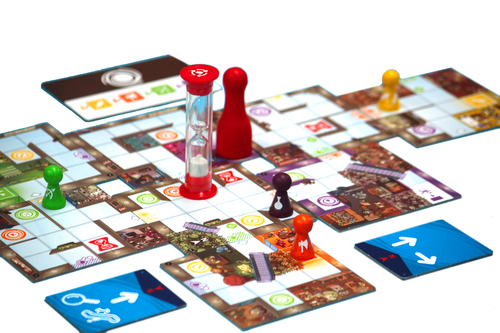Learning rules through play: Magic Maze and board game tutorials

- January 24, 2019
Jess Gates
Jess Gates is a game designer with a huge passion for accessibility. They have supported people with disabilities in accommodation and community settings, and run camps and activity programs for young people and families experiencing disadvantage. Jess enjoys creating games about ethical and social issues, and enabling creators of games, things and spaces to actively and intentionally include all kinds of people.
You work together to get your characters through the buildings, hurrying as the timer ticks on. You grab your weapons, avoid the guards and race to the exit…
Congratulations! You’ve completed scenario one!
The tiles quickly vanish, and you’re placed in the centre again ready for whatever next awaits your party.
This sounds like your average fantasy-style video game quest situation: except it’s not.
It’s part of the tutorial system in Magic Maze, a cooperative board game where you work together as fantasy characters to steal new weapons and magical items from a mall, and travel through portals, escalators, and doorways to find the exit before the security guards catch you.
The game is broken down into 17 playable scenarios, 7 of which form the Initiation Campaign. Each of these introduces a new rule in an effortless and logical way, building on your knowledge of the Magic Maze world and your characters.
Playing the second scenario, for example, each pawn must exit the mall in their specific coloured door. In previous scenarios, pawns could exit the mall through any door available to them, allowing players to focus on the movement system and timer mechanics.
This style of learning is super useful for most people, but especially those who are easily overwhelmed by multitudes of instructions and concepts or find it difficult to remember an onslaught of symbols and rules. Because no matter how straightforward and clear a rulebook can be, there’s still the same problem.
After you read it, you still have to implement all those rules at the same time.
I spend the first play of any new board game simply getting my head around the world, the systems, and how they interact. As a result, I generally end up walking away with minimal points to my name and a general feeling of confusion and loss, as the world I was just beginning to understand returns to its box.
Magic Maze flips this on its head in one way by being cooperative: you win or lose as a group. This sense of togetherness complements the tutorial system nicely as players have multiple attempts to strengthen their team spirit in their weapon-stealing adventures.
Players are then welcome to play a scenario multiple times to solidify their knowledge of one rule in particular, without needing to focus on all of the others simultaneously.
Magic Maze is designed for players to learn the game, not just to play the game. The Initiation campaign feels like a natural part of the Magic Maze world, rather than an add-on that you play until you are ‘good enough’ for the real game.
We need more board games like this: where players can feel like heroes at each scenario, instead of only when they have mastered all the rules and mechanics.
